暑期保研夏令营申请表
2020年优秀大学生暑期夏令营申请表【模板】
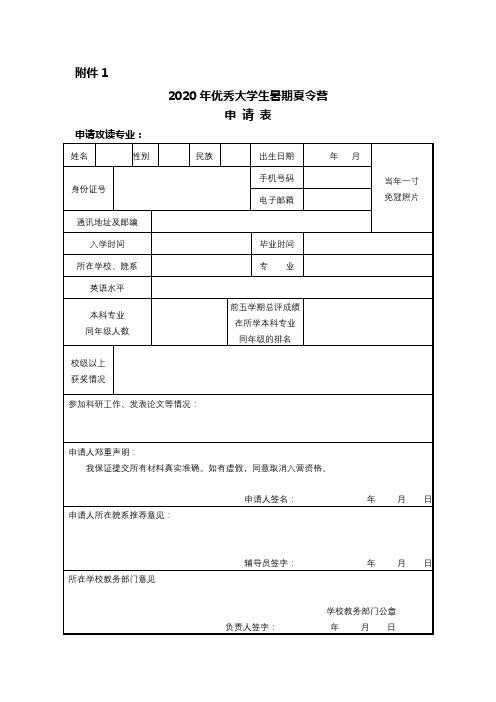
申请人所在院系推荐意见:
辅导员签字:年月日
所在学校教务部门意见
学校教务部门公章
负责人签字:年月日
附件1
2020年优秀大学生暑期夏令营
申请表
申请攻读专业:
姓名
性别
民族
出生日期
年月
当年一寸
免冠照片
身份证号
手机号码
电子邮箱
通讯地址及邮编
入学时间
毕业时间
所在学校、院系
专业
英语水平
本科专业
同年级人数
前五学期总评成绩在所学本科专业
同年级的排名
校级以上
获奖情况
参加科研工作、发表论文等情况:
申请人郑重声明:
我保证提交所有材料真实准确。如有虚假,同意取消入营资格。
全国优秀大学生夏令营申请表
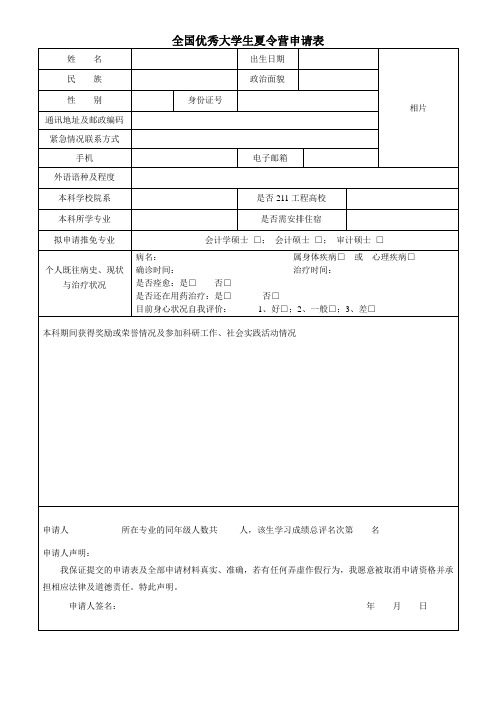
是否痊愈:是□否□
是否还在用药治疗:是□否□
目前身心状况自我评价:1、好□;2、一般□;3、差□
本科期间获得奖励或荣誉情况及参加科研工作、社会实践活动情况
申请人____________所在专业的同年级人数共_____人,该生学习成绩总评名次第____名
申请人声明:
我保证提交的申请表及全部申请材料真实、准确,若有任何弄虚作假行为,我愿意被取消申请资格并承担相应法律及道德责任。特此声明。
全国优秀大学生夏令营申请表
姓名
出生日期
相片
民族
政治面貌
性别
身份证号
通讯地址及邮政编码
紧急情况联系方式
手机
电子邮箱
外语语种及程度
本科学校院系
是否申请推免专业
会计学硕士□;会计硕士□;审计硕士□
个人既往病史、现状
与治疗状况
病名:属身体疾病□或心理疾病□
确诊时间:治疗时间:
暑期夏令营申请表

申请人的基本情况
姓 名
性 别
近期一寸免冠照片
身份证号
ZZ面貌
就读高校
就读院系
专业
外语水平
CET4分 CET6分其他
能否获得推荐免试资格通来自地址邮 编电子邮箱
联系电话
个人简介
(包括专业特长、专业兴趣等)
本科期间获奖情况
参与的科研工作与学术成果
(发表的论文、出版物或其他能体现自身学术水平的工作成果)
申请人签名:年 月 日
院系推荐意见
院系负责人签名:年月日
院系盖章
成绩排名证明
申请人所在(院系、专业)的同年级人数为人。该生前二年半学习成绩总评名次:第名,在前%以内。 (请务必填写所在院系同年级总人数,名次和在前%几)
教务部门负责人签字:(学校教务部门公章)年 月 日
申请人的声明
申请人郑重声明:
我保证提交全部申请材料真实、准确,若有任何弄虚作假行为,我愿意被拒绝申请或取消入营资格。
2020年北京理工大学先进结构技术研究院暑期夏令营申请表【模板】
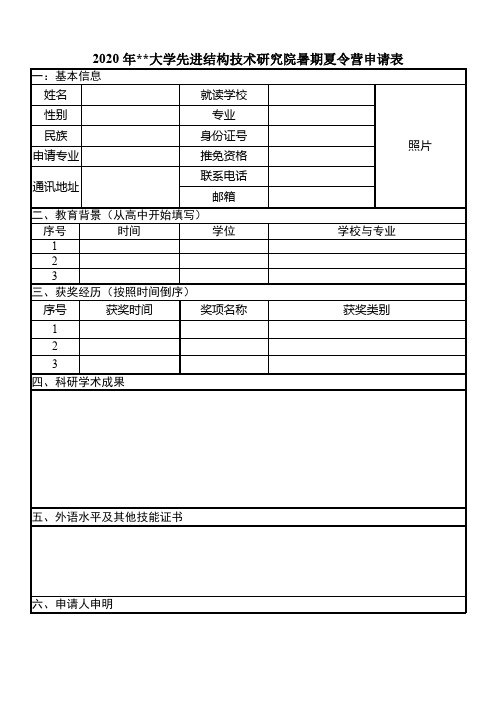
一:基本信息
姓名
就读学校
照片
性别
专业
民族
身份证号
申请专业
推免资格
通讯地址
联系电话
邮箱
二、教育背景(从高中开始填写)
序号
时间
学位
学校与专业
1
2
3
三、获奖经历(按照时间倒序)
序号
获奖时间
奖项名称获奖类别123四、科研学术成果
五、外语水平及其他技能证书
六、申请人申明
我保证提交的申请表及全部申请材料真实、准确,若有任何弄虚作假行为,我愿意被拒绝并承担相应的责任。
特此声明。
申请人签名:
时间:年月日
北京理工大学教育研究院2017年暑期夏令营活动申请表【模板】

院系盖章
备注:个人自述、成绩单、学生证、身份证和各种证书的复印件请附在本表格的后面
**大学教育研究院制表
**大学教育研究院2017年暑期夏 Nhomakorabea营活动申请表
基本信息
姓 名
性别
出生年月
贴申请人近照
身份证号
就读院校
就读院系
就读专业
外语水平
四级分 六级分 其他
通讯地址
邮编
电子邮箱
固定电话:
手机:
家长姓名
家长联系方式:
教育背景
(自高中起)
何时何地获得何种奖励或荣誉
(本科期间)
何时参加过哪些科研工作,有何学术成果
(发表的论文、出版物或其他能体现自身学术水平的工作成果)
申请人成绩排名证明
申请人所在专业同年级人数为人,该生排第名(成绩截止至第学期)
教务处或院系负责人签名: 年 月 日
教务处或院系盖章
申请人声明
我保证提交的申请表及全部申请材料真实、准确,若有任何弄虚作假行为,我愿意被拒绝申请或取消推荐免试资格并承担相应的责任。
特此声明。
申请人签名: 年 月 日
申请人所在高校院系推荐意见
北大保研夏令营申请表

北大保研夏令营申请表第一篇:北大保研夏令营申请表Health Care Financing and ManagementSyllabus, Spring 2011, Yan Feng-------------------Health Care Financing and ManagementHSBC Business School Peking University Instructor: Feng, Yan Room407, Building C, HSBC Business School****************Class Hours: April 25th to June 24thTuesdays and Fridays3:30pm-5:20pmClassroom: C102Office Hours: Wednesdays 2:00pm-4:00pm, or by appointment.Teaching Assistant: TBD1.Course Overview Arrow highlighted the prevalence of uncertainty in health care markets: physicians areuncertain about how to treat patients, especially when medical technology is changing so rapidly;patients are uncertain about the effectiveness of medical treatment;and consumers and health plans are uncertain about the appropriateness and quality of providers’ services.Economic models explain some but by no means all consumer and producer behaviors in the medical services sector, and as for making health care policies, the economic concept of efficiency is a helpful criterion but not the only criterion for judging the desirability of alternative arrangement(e.g., distributions and redistributions).Given the uneasy balance of efficiency and equality/equity, there is by no means a best health care system suitable for every society, whichis especially true for a developing economy Like China.In this class we will discuss why standard economic models of behavior and efficiency sometimes work and matter and sometimes do not in this industry.We are going to discuss the available information related but not limited to the following questions: do people behave in ways that are or could be made to be efficient(and equitable)? how much inefficiency is there in this industry and what are the causes? how is health care usually financed in a society? and how might a country better manage its resources dedicated to improving the health of its population?The main context of this course is:(1)to consider the economic analysis of the medical care sector, namely how medical care is provided and financed;(2)to explore the implication of market failures in health care market such as moral hazard, adverse selection, and externality;and(3)to help you get informed with the making of health policies and how different health system evolved and developed, and also to discuss various reform ments and questions in class are strongly encouraged.Things that seem confusing or controversial are usually that way for many students;everyone will benefit if you ask questions.And because the class will deal with policy, there is a lot of room for honest feedback and constructive disagreement.No one knows the complete answer, or even the right answer, to many of the questions that will be raised in the classes.We do not set out to find the perfect answers, in different context, a solution may have quite ambiguous delivery and effect.However, if you do not think you can tolerate the fact that most of the discussion will be from the point of view of economists and will seem to be somewhat detached(that is, not from the point of view of a beneficiary or a kind-heartedphilanthropist), then you probably shouldn’t be taking this class.2.Course Requirements Requirements •Students are suggested and expected to read all assigned readings or notes before each class;• Any submitted work should be typed, using 12-pitch font size and Times New Roman or Arial type(no fancy fonts, please), double-spaced, and with no more than one-inch margins;submitted work can be hard copies(dropped in my mailbox before deadlime)or electronic versions, attention to English grammar and clarity of writingare expected;• Assignments, if any, are expected to be turned in before te submission will b e graded as “0” unless permission from the professor is granted in advanceunder special circumstances.CourseworkThere is no regular homework for this class, but you will be requested to write a term paper on a health topic that is of interest to you, it does not have to be an academic research paper.The paper should be at least 8 pages long(single-sided), but not exceeding 12 pages.Youmay use materials from the class, journal articles, magazine and newspaper articles, and the internet to support your argument in your paper, but there should be NO copying and pasting from the original materials.The format should be consistent with the course requirement.The deadline for turning in the paper is June 28th, 5:30pm sharp.Grading(tentative) Class participationTerm paperMidterm exam(closed book)Final exam(closed book)3.Course Materials 10% 30% 30% 30%Students are not required to buy books for this class.However, I do recommend 2 books as ing to the classes prepared and taking necessary notes will be the most efficient and beneficial way of acquiring a broad and systematic understanding of the topics.2Recommended Books• Charles E.Phelps, Health Economics, Addison-Wesley Series in Economics, 4th Edition, 2009• Sherman Folland, Allen Goodman, and Miron Stano, The Economics of Health and Health Care, Prentice Hall, 6th Edition, 2009In addition, “Handbook of Health Economics”, edited by A.J.Culyer and Joseph PNewhouse(Volume A and B, Elsevier Science, 2000, will be a great reference if you are seriously interested in research in health care related issues.Additional ReadingsReadings are listed for each topic, all of which are strongly recommended for the students to master the comprehensive original discussion.4.Class ScheduleDue to the scheduled amount of teaching hours, in this class, we will be covering the most basic and most important topics, which include several subtopics.There may be certain topics not covered during this time period that you are interested to know, I suggest the students to find the answers in the reading materials and the books, and to utilize other public sources for updated debates regarding health care issues.T opic 1 Introduction: What’s Different about Medical Care? Overview of theHealth Care marketReadingsArrow, K enneth, 1963, “Uncertainty and the Welfare Economics ofMedical Care,” The American Economic Review 53(5): 941-973.The Demand for Medical Care and Health Topic 2ReadingsGrossman, Michael, 1972, “On the Concept of Health Capital and theDemand for Health,” The Journal of Political Economy 80(2): 223-255.Dardanoni, Valentino and Adam Wagstaff, 1987, “Uncertainty,Inequalities in Health and the Demand for Health,” Journal of HealthEconomics 6: 283-290.(A simpler version of the Grossman model ispresented in this article.You may want to read this article first).Porter, Michael E.2010, “What is Value in Health Care?” New EnglandJournal of Medicine 363:2477-2481.3Topic 3Topic 4 Mushkin, Selma, 1962, “Health as an Investment,” The Journal of Political Economy 70(5):129-157.Ellen O'Brien, 2003, “Employers' Benefits from Workers' Health Insurance,” The Milbank Quarterly 81(1):5-43.Financing Health Care: Health Insurance, Risk Pooling and Moral HazardReadings Pauly, Mark, 1968, “The Economics of Moral Hazard,” The American Economic Review 58(3): 531-537.Manning, Willard et a1.1987, “Health Insurance and the Demand for Medical Care,” The American Economic Review 77(3): 251-277.Zeckhauser, Richard, 1970, “Medical Insurance: A Case Study of Trade-Off between Risk Spre ading and Appropriate Incentives,” Journal of Economic Theory 2(1): 10-26.Rosett, Richard N.and Lien-fuHuang, 1973, “The Effect of Health Insurance on the Demand for Medical Care,” The Journal of Political Economy 81(2): 281-305.Gaynor, Martin et al., 2000, “Are Invisible Hands Good Hands? Moral Hazard, Competition, and the Second-Best in Health Care Markets,” The Journal of Political Economy 108(5): 992-1005.Ehrlich, Isaac and Gary Becker, 1972, “Market Insurance, Self-Insurance, and Self-Protection,” The Journal of Political Economy 80(4): 623-648.Financing Health Care: Individual and Group Health Insurance,Asymmetric Information and Risk SelectionReadingsAkerlof, George, 1970, “The Market for Lemons,” The Quarterly Journal of Economics 84(3): 488-500.Cutler, David and Richard Zeckhauser, 2000, “The Anatomy of HealthInsurance,” in Handbook of Health Economics, Vol.1A, Chapter 11: 606-629 only.Rothschild, Michael and Joseph Stiglitz, 1976, “Equilibrium inCompetitive Insurance Markets: An Essay on the Economics of Imperfect Information,”The Quarterly Journal of Economics 90(4): 629-650.Topic 5Topic 6 Frank, Richard G., Jacob Glazer, and Thomas G.McGuire, 2000, “Measuring Adverse Selection in Managed Health Care,” Journal of Health Economics 19:829–854.Financing Health Care: Health Care and the Public SectorReadings Cutler, David, 2002, “Health Care and the Public Sector,” in Handbook of Public Economics, Vol.4, Chapter 31(except for sections 5&8).Cutler, David and Jonathan Gruber, 1996, “Does Public Insurance Crowd Out Private Insurance?” The Quarterly Journal of Economics 111(2):391-430.Pauly, mark, 1974, “Overinsurance and Public Provision of Insurance: TheRoles of Moral Hazard and Adverse Selection, ” The Quarterly Journal of Economics 88(1):44-62.The Supply of Medical Care: Asymmetric Information and Agency,Hospitals and Physicians ReadingsGoldstein, Gerald and Mark Pauly, 1976, “Group Health Insurance as aLocal Public Good,” in the Role of Health Insurance in the HealthServices Sector, ed.Rosett, N BER.Pauly, Mark, 1995, “Paying Physicians as Agents: Fee for Service,Capitation or Hybrids?” in Health Care Policy and Regulation.Kluwer, ed.T.Abbott, ch9: 163-174.Ellis, Randall and Thomas McGuire, 1990, “Optimal Payment Systemsfor Health Services,” Jour nal of Health Economics 9:375-396.McGuire, Thomas and Mark Pauly, 1991, “Physician Response to FeeChanges With Multiple Payers,” Journal of Health Economics 10(4): 385-410.Pauly, Mark and Michael Redisch, 1973, “The Not-For-Profit Hospital as a Physicians' Co-operative,” The American Economic Review 63(1): 87-100.Newhouse, Joseph, 1970, “Toward a Theory of Nonprofit Institutions: An Economic Model of a Hospital,” The American Economic Review 60(1):64-74.Topic 7 Topic 8 Dranove, David, 1988, “Pricing by Non-Profit Institutions: The Case of Hospital Cost-Shifting,” Journal of Health Economics 7(1): 47-57.The Market for PharmaceuticalsReadings Scherer, F.M., 2000, “The Pharmaceutical Industry,” in Handbook of Health Economics, Vol.1B, Chapter 25.Grabowski, Henry and John Vernon, 2000, “The Determinants of Pharmaceutical Research andDevelopment Expenditures,” Journal of Evolutionary Economics 10:201-215.Kyle, Margaret, 2005, “Pharmaceutical Price Controls and Entry Strategies,” Working paper.Lichtenberg, Fran k, 1998, “Pharmaceutical Innovation, Mortality Reduction, and Economic Growth,” NBER working paper 6569.Lichtenberg, Frank R.and T omas J.Philipson, 2002, “The Dual Effects of Intellectual Property Regulations: Within-and Between-Patent Competition in the U.S.Pharmaceuticals Industry, ” Journal of Law and Economics 45(2): 643-672.Health System Reforms ReadingsBurton A.Weisbrod, 1991, “The Health Care Quadrilemma: An Essay on Technological Change, Insurance, Quality of Care, and CostContainment,” Journal of Economic Literature 29(2):523-552.Cutler, David, 2002, “Equality, Efficiency, and Market Fundamentals: The Dynamics of International Medical-Care Reform,” Journal of EconomicLiterature 40(3): 881-906.Diamond, Peter, 1992, “Organizing the Health Insurance Market,”Econometrica 60(6): 1233-1254.5.Important DatesTerm paper due: 5:30pm June 28thMidterm: May 24thFinal: TBD第二篇:北大保研法学院推荐免试攻读法律硕士(法学)研究生选拔办法(2014年9月修订)为规范北京大学法学院(以下简称“法学院”)招录推荐免试攻读法律硕士(法学)研究生的工作,依据教育部和北京大学有关规定,制定本办法。
学生保研夏令营申请书模板
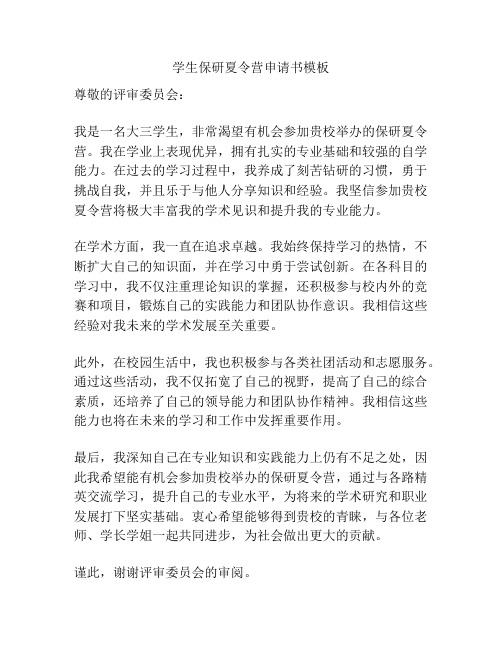
学生保研夏令营申请书模板
尊敬的评审委员会:
我是一名大三学生,非常渴望有机会参加贵校举办的保研夏令营。
我在学业上表现优异,拥有扎实的专业基础和较强的自学能力。
在过去的学习过程中,我养成了刻苦钻研的习惯,勇于挑战自我,并且乐于与他人分享知识和经验。
我坚信参加贵校夏令营将极大丰富我的学术见识和提升我的专业能力。
在学术方面,我一直在追求卓越。
我始终保持学习的热情,不断扩大自己的知识面,并在学习中勇于尝试创新。
在各科目的学习中,我不仅注重理论知识的掌握,还积极参与校内外的竞赛和项目,锻炼自己的实践能力和团队协作意识。
我相信这些经验对我未来的学术发展至关重要。
此外,在校园生活中,我也积极参与各类社团活动和志愿服务。
通过这些活动,我不仅拓宽了自己的视野,提高了自己的综合素质,还培养了自己的领导能力和团队协作精神。
我相信这些能力也将在未来的学习和工作中发挥重要作用。
最后,我深知自己在专业知识和实践能力上仍有不足之处,因此我希望能有机会参加贵校举办的保研夏令营,通过与各路精英交流学习,提升自己的专业水平,为将来的学术研究和职业发展打下坚实基础。
衷心希望能够得到贵校的青睐,与各位老师、学长学姐一起共同进步,为社会做出更大的贡献。
谨此,谢谢评审委员会的审阅。
此致敬礼。
复旦大学优秀大学生夏令营活动申请表
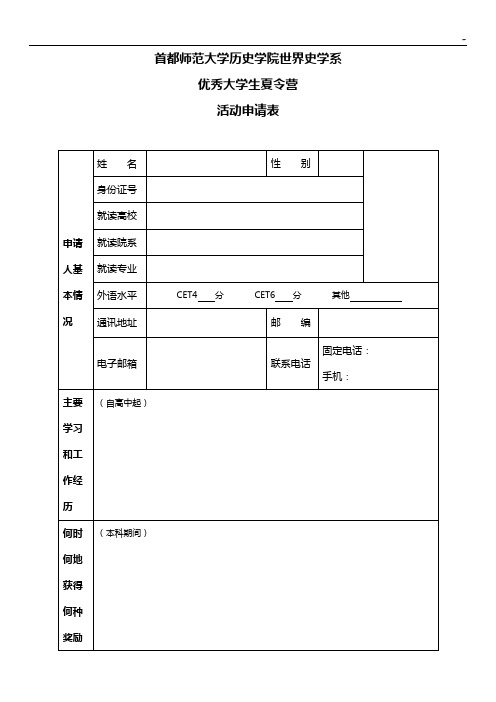
推位
联系电话
电子邮箱
申请人所在高校院系推荐意见
院系负责人签名: 年 月 日
院系盖章
附件材料目录
推荐信(一、二)
外语成绩证明
本科成绩单
其他
1.
2.
3.
申请人声明
我保证提交的申请表及全部申请材料真实、准确,若有任何弄虚作假行为,我愿意被拒绝申请或取消推荐免试资格并承担相应法律及道德责任。
首都师范大学历史学院世界史学系
优秀大学生夏令营
活动申请表
申请人基本情况
姓 名
性 别
身份证号
就读高校
就读院系
就读专业
外语水平
CET4分CET6分其他
通讯地址
邮 编
电子邮箱
联系电话
固定电话:
手机:
主要学习和工作经历
(自高中起)
何时何地获得何种奖励或荣誉
(本科期间)
何时参加过哪些科研工作,有何学术成果
(发表的论文、出版物或其他能体现自身学术水平的工作成果)
特此声明。
申请人签名: 年 月 日
学生保研夏令营申请书

您好!我叫[姓名],是[本科院校]的[专业]专业的一名学生。
在得知贵校举办保研夏令营活动后,我怀着无比激动的心情,郑重地向您提交这份申请书。
在此,我希望能借此机会,表达我对贵校的向往和对科研事业的热爱。
首先,请允许我简要介绍一下自己的基本情况。
我本科期间,学习成绩优异,专业排名靠前,曾获得[具体奖项]等荣誉。
在学术研究方面,我积极参与课题项目,曾在[具体项目]中担任[具体职位],负责[具体任务]。
此外,我还具备较强的英语能力,通过了英语六级考试,并具备一定的英语听说读写能力。
我对贵校的向往源于以下几点:1. 贵校拥有雄厚的师资力量和一流的科研条件,为学子们提供了广阔的学术平台。
我相信,在贵校的学习和研究中,我将得到更多宝贵的经验和知识。
2. 贵校注重培养学生的创新能力和实践能力,鼓励学生积极参与科研项目。
这与我个人的学术追求和职业规划不谋而合。
3. 贵校的学术氛围浓厚,有利于激发学生的求知欲和探索精神。
我渴望在这样的环境中,与优秀的同行们共同成长、共同进步。
为了更好地适应贵校的学习和研究环境,我在以下方面做了充分准备:1. 积极参加各类学术讲座和研讨会,拓宽自己的学术视野。
2. 主动承担课题项目,提高自己的科研能力。
3. 不断加强英语学习,提高自己的语言水平。
4. 积极参加社会实践,锻炼自己的团队协作能力和沟通能力。
在未来的学习和研究中,我将以以下目标为导向:1. 深入学习专业知识,提高自己的学术素养。
2. 积极参与科研项目,争取在国内外学术期刊发表高水平论文。
3. 为国家和社会的发展贡献自己的力量。
最后,我衷心希望能得到贵校的青睐,参加本次保研夏令营活动。
在此,感谢您在百忙之中审阅我的申请书。
如有需要,请随时与我联系。
我期待着在贵校与您共同探讨学术问题,共同追求科研梦想。
谨祝您工作顺利,身体健康!此致敬礼![姓名] [申请日期]。
广东工业大学2020届优秀大学生读研夏令营活动申请表

申请人在本专业所有学生中成绩绩点名次为第名。
推荐院(系)负责人签字:推荐院(系)公章
年月日
自荐书
(介绍本人学习情况、曾参与过的科研工作、科研学术兴趣以及其他对于申请成功有参考价值的内容等)
获奖情况:
发表论文或参加科研活动情况:
本人保证,以上所填一切内容(包括本人所提供的所有申请材料)均符合本人真实情况,本人对此承担一切责任。
申请人签字:
年月日
注:此表须正反面打印,填写后连同本人本科期间成绩单(加盖教务处公章)原件、英语等级考试成绩单复印件及其他有关材料(获奖证书、本人代表性学术论文、出版物或原创性工作成果等)复印件一并寄(送)到所申请学院(部、所)。
广东工业大学届优秀大学生读研夏令营活动申请表
姓名
出生日期
年月日
照
片
半年内一寸
免冠正面照片
性别
政治面貌
民族
身份证号
本人通讯地址
及邮政编码
联系电话
所在学校、院系、专业
成绩绩点
入学年月
年月
毕业年月
年月
外语语种及等级水平(成绩)
申请的学院(部、所)
申请的专业及研究方向
申请人所在院(系)推荐意见(关于申请人思想品德、知识结构、外语
